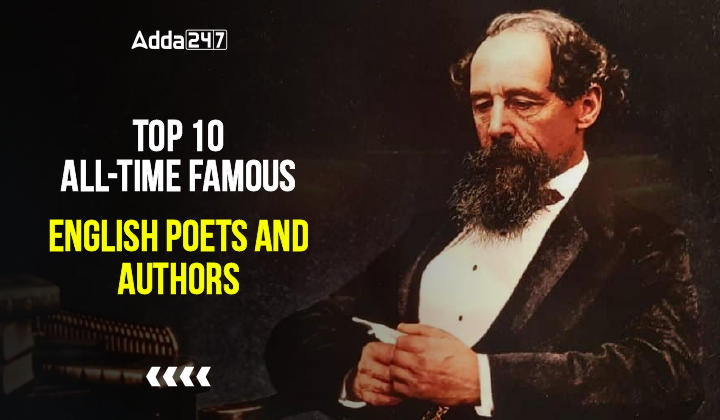Table of Contents
The English literary landscape boasts a plethora of remarkable poets and authors whose works have left an indelible mark on literature and culture. From the timeless sonnets of Shakespeare to the thought-provoking prose of Jane Austen, the contributions of these literary luminaries have shaped the world of English literature and continue to inspire readers across generations. In this article, we will explore the top 10 all-time famous English poets and authors, celebrating their remarkable literary achievements and lasting impact.
UGC NET English Literature Notes PDF
Top 10 All-Time Famous English Poets and Authors
The history of English Literature goes as far back as the 10th Century. Thus, choosing only 10 famous poets and writers among all the writers, poets, playwrights, and critics is not an easy task. There is no objective way of determining the absolute universal list of the top 10 famous writers, as there is going to be a certain level of subjectivity to the list. One can easily make a case for some other poets and authors to be on the list.
With that said, let’s check out the top 10 all-time famous English Poets and Authors. These are selected for their tremendous contribution, influence, and overall authority that still remains relevant to this date.
William Shakespeare
No conversation about all-time famous writers, regardless of language, is complete without including William Shakespeare. He is the towering figure in English Literature who changed the complexion and took English drama to new heights. The level of competence and skill showcased by Shakespeare was hardly ever matched by anyone till now.
He wrote during the Elizabethan Age. Most of his works were produced during the period from 1591-1611. He is still known for his universal appeal, handle over language and meter like no other. His characterization is unparalleled, which came to the forefront, especially in his tragedies. Some of his most famous works include “Hamlet,” “King Lear,” “Macbeth,” and more.
William Wordsworth
When you talk about poetry and famous poets, the conversation must start with Wordsworth. He single-handedly brought a trend in English Literature. He is so famous for his poetry that his name can be synonymously used for Romanticism. His work can be best defined as imbibed with an appreciation for nature and the tender side of life and emotion.
His influence on his contemporary and later generations is immense. He is best known for Lyrical Ballad, which was co-written by S.T. Coleridge. He wrote plenty of other amazing poetry that is still read to this day. Some of his most popular works include “I Wandered Lonely as a Cloud,” “The Solitary Reaper,” “The Lucy Poems,” and more.
Oscar Wilde
A literary genius known for his wit, humour, and exploration of societal norms, Oscar Wilde holds a significant place in English Literature. His works are known for their sharp social commentary, and he was one of the prominent playwrights of the late 19th century.
Wilde’s most famous play, “The Importance of Being Earnest,” is a classic of comedic theatre, and his novel “The Picture of Dorian Gray” remains a thought-provoking masterpiece. His ability to blend satire with a profound understanding of human behaviour makes his works timeless and widely celebrated.
Jane Austen
When it comes to Women writers, Jane Austen’s name must be placed on the top of the list due to the simple fact that she was among the earliest women writers to produce works that weaved engaging plots with the social commentary of the time, the end of the 18th Century.
One interesting trivia about her famous work “Sense And Sensibility” is that it was published anonymously “by a Lady.” She remains relevant to this day due to the fact that her works provide a window to her time and her ability to portray intricate emotions and behaviour. Some of the other works by Jane Austen are “Pride and Prejudice,” “Emma,” “Persuasion,” “Northanger Abbey,” and “Mansfield Park.”
Virginia Woolf
Another name that stands tall in the conversation among modern English writers is Virginia Woolf. She was the pioneer in the use of Stream of Consciousness as a narrative device. Using this device, she revealed and described the thoughts and feelings of the narrator.
Her works are a great study of the human psyche and human emotions. She talked about her time which was fast changing, gender roles, sexuality, and other severe topics with authority and boldness like no other. Some of her famous works include “Mrs Dalloway,” “A Room of One’s Own,” “To the Lighthouse,” and more.
Bronte Sisters
Technically, these are three sisters, Emily, Charlotte, and Anne Bronte. Taken together, they produced works that resonated with the masses, especially women. They wrote intense, dramatic, and tragic novels.
Emily Bronte wrote “Wuthering Heights,” now considered a classic work.
Apart from her, Charlotte Bronte wrote “Jane Eyre,” another English Classic that is read to this day. These sisters were some of the earliest women writers who wrote works that are still read today. Anne Bronte wrote “The Tenant of Wildfell Hall.”
George Orwell
In the Context of modern writers, the works of George Orwell is studied for his unrelenting and sharp criticism of totalitarianism that was prevalent during the twentieth century. He was one of the early “woke writers” who illustrated the potential of the working class to generate its own resources out of an everyday struggle.
His most famous work, “Animal Farm,” is read even today for its outstanding social criticism, advocacy for democracy and egalitarian ideals. Some of his other famous works include “1984,” “Homage to Catalonia,” “Burmese Days,” and more.
John Milton
Going back in time, After the Elizabethan period when Shakespeare was done writing, there was a colossal vacancy as no other writer even came close. However, John Milton took the tradition of English Literature forward with his immaculate poetry that is read even today.
He wrote epic poetry. His most famous work, “Paradise Lost,” is one of the most recognizable pieces of work in English Literature. It is widely regarded as the greatest epic poem in English. Some of the other poetries include “Paradise Regained” and “Samson Agonistes.”
Charles Dickens
The dawn of the Industrial Revolution in England was a chaotic time that witnessed plenty of socio-cultural changes. One writer who was able to capture the change and provide commentary and sharp critique aptly was Charles Dickens. Due to this, his works have a universal appeal that is timeless.
His works mostly talked about the changes affected by the mechanization of society. He wrote about the poor strata of society and showed their struggle in his works. Some of his most famous works include “Hard Times,” “Great Expectations,” “Bleak House,” and more.
T.S Elliot
Finally, one of the modern giants who influenced the core of writing and started new schools of thought was T.S Elliot. He influenced the school of New Criticism, but he was mostly known for his modernist poetry, which stands him apart from his peers.
He lived a tumultuous life, and as parts of it came to his most incredible creation, “The Waste Land.” The poem is often read as a representation of the disillusionment of the post-war generation. Some of his other famous works include “The Love Song of J. Alfred Prufrock,” “The Hollow Men,” “Ash Wednesday,” and more.
Download UGC NET English Study Notes PDF
The direct link to download UGC NET English Study Notes PDF has been given below. Check and download through below link study notes of Top 10 All-Time Famous English Poets and Authors.
Download Top 10 All-Time Famous English Poets and Authors Study Notes PDF




 Early Childhood Care and Education (ECCE...
Early Childhood Care and Education (ECCE...
 Stages of Creativity: Definition, Concep...
Stages of Creativity: Definition, Concep...
 Stages of Child Development and Growth C...
Stages of Child Development and Growth C...







